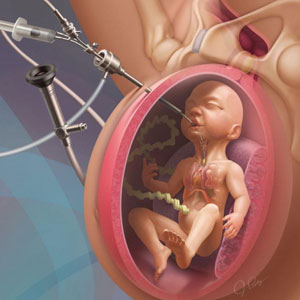Fetal diagnostic procedures in Guntur are done to identify any abnormalities or discrepancies in the growth and development of the child. Most of the blood tests and ultra sound tests are done at gynaecology hospitals in Guntur as part of the complete prenatal check up during pregnancy. These tests are mainly focused on the wellbeing of the embryo. They include genetic screening as well as measuring the organ development etc., however there could be certain situations where a slightly more invasive method may be used to diagnose certain conditions.
Amniocentesis:
This is a diagnostic test which is usually performed in order to get the genetic evaluation of the fetus. This procedure is done after a minimum of 16 weeks of pregnancy. It’s often recommended to visit a genetic counsellor before having this test done to understand its intricacies. Using an ultra sound as guide, a fine needle is pierced through the abdomen into the amniotic sac so as to obtain a sample of the amniotic fluid which is sent for genetic testing.
Chorionic Villus Sampling
In this process the chronic villi which are on the top of the placenta are sampled for diagnosing disorders. This is usually performed between 11-13 weeks of pregnancy depending on the position of the placenta. This procedure can be done in two ways, trans vaginally that is through the vagina or using a fine needle over the abdomen. Either ways the procedure would be completely guided by an ultrasound. This test can help to find any inherited or congenital disease.

Percutaneous Umbilical Blood Sampling
In this process a needle is inserted guided by ultrasound into the abdomen and to the umbilical cord and the fetus’s blood is drawn out to be tested. This method is much more severe and rare when compared to the other procedures as the risks associated with this are also high. The main purpose for the use of this method is to find out if the fetus has anemia, in case of severe anemia, blood transfusion is done to the fetus.
Selective Fetal Reduction
Most of the times, assisted reproductive methods tend to increase the odds of having a multiple pregnancy or carrying more than one fertilised embryo. The more the number of babies, more are the risks and complications associated and also decreases the chances of healthy delivery of all babies. Most widely recognised issues are still birth or premature delivery which in turn can cause reduced developmental and intellectual growth.
In some instances one the fetus among others may be diagnosed with a lethal anomaly which may not be compatible with life where in that fetus can be reduced saving the other fetuses, however these procedures depend on the chorionicity of the pregnancy. Selective fetus reduction is an ultrasound guided procedure in which the number of fetuses are reduced so as to maximise the chances of a successful pregnancy. This procedure is usually done between 11-13 weeks of pregnancy. This procedure has its own pros and cons which will be explained by the operator to the patient and attendants before the procedure.
Fetal Therapy:
Fetal therapy in Guntur is the diagnosis and treatment of fetal abnormalities. In other words it is the diagnosis and treatment of fetal issues before the birth. There are many aspects to keep in mind when it comes to fetal therapy, the timing of the treatment should in no way endanger the mother or baby.
Conditions treated under fetal therapy include:
- Twin-to-twin transfusion Syndrome: huge difference in amount of blood supplied to identical twins
-
Selective fetal growth restriction: Unequal share of placenta in identical twins - Twin anemiapolycythemia sequence (TAPS): Difference in blood counts in identical twins
- Twin reversed arterial perfusion sequence (TRAP): One twin functions without heart.
Consult diagnostic fetal therapy doctors for fetal medicine in Guntur
